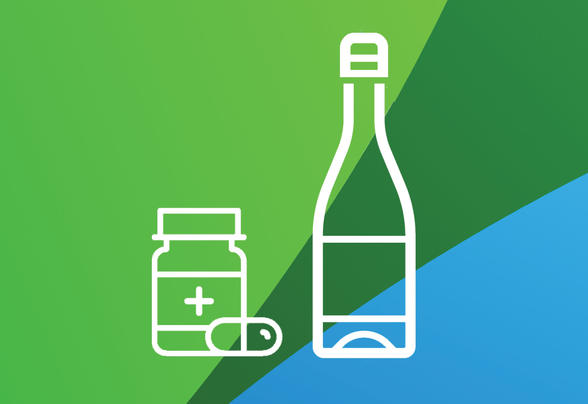The COVID-19 pandemic has created an unprecedented public health situation that affects many aspects of daily life, including work, self-care and relationships. People at risk of problematic alcohol and other drug use could face particular challenges, as extraordinary situations can prompt a range of reactions and responses.
Information and support
People who do not normally use substances or those who engage in low-risk alcohol and/or other drug use could find that their ways of coping have changed. These changes can result in an increased risk of problematic patterns of use (such as starting drinking alcohol or drinking more each day than they usually would).
Those who have previously experienced problems with alcohol and/or other drugs could find the current situations heightens their risk of lapse or relapse, while people already experiencing problematic substance use could find themselves at greater risk of harm.
There are several professional and self-help organisations that offer information about alcohol and other drugs, harm-reduction resources, and options for support for individuals and family members, including young people.
This includes information for:
- the general community (including young people)
- families affected by alcohol and other drug use
- people who use alcohol and other drugs
- people experiencing problems with alcohol and drugs.
Managing stress and uncertainty
Stress-management strategies include:
- exercising
- maintaining normal routines
- talking to friends and family by phone or online
- eating nourishing food
- taking time to relax
- doing something you enjoy
- acknowledging that this is a difficult time and remembering that you have got through difficult situations before.
Reducing the health risks of drinking alcohol
Difficult times can lead to increased alcohol consumption. Alcohol might make you feel less stressed in the short term, but it can result in increased anxiety and depression over time. Alcohol has negative effects on sleep and the immune system.
The current Australian Guidelines to Reduce Health Risks from Drinking Alcohol (under review by the National Health and Medical Research Council) advise:
- For healthy adults, drinking no more than two standard drinks on any day reduces the lifetime risk of harm from alcohol-related disease or injury; and drinking no more than four standard drinks on a single occasion reduces the risk of alcohol-related injury.
- For children and young people under 18, not drinking alcohol is the safest option.
- Children under 15 years are at the greatest risk of harm from drinking. Not drinking alcohol is especially important for this group.
- The safest option for people aged 15 to 17 years is to delay the initiation of drinking for as long as possible.
- Pregnancy and breastfeeding
- Maternal alcohol consumption can harm the developing fetus or breastfeeding baby.
- Not drinking is the safest option for those who are pregnant or planning a pregnancy.
If you think you are drinking too much, seek help from a self-help group or a professional, and limit the amount of alcohol in your home.
General community
Alcohol and other drug information, advice and support services include:
Adis 24/7 Alcohol and Drug Support. Free support for people in Queensland with alcohol and other drug concerns. Phone support for individuals, families, friends and health professionals, with information, self-assessment tools and downloadable resources.
Phone 1800 177 833
https://adis.health.qld.gov.au/
Alcohol and Drug Foundation. A range of alcohol and drug resources.
Phone 1300 85 85 84
Ask Izzy. Lists location-based help and support for drugs and alcohol, housing, domestic and family violence, access to food, and other community services.
Hello Sunday Morning. Alcohol-specific self-help online resource.
https://www.hellosundaymorning.org/
Drinks Meter. A free app that provides anonymous, personalised feedback on alcohol consumption, available via iTunes and Android
On Track. Self-guided programs for tracking mood and alcohol use.
Young people
Services supporting young people include:
Reach Out. Resources on topics including alcohol and other drugs.
headspace. Information and resources, online and phone counselling services.
Families affected by alcohol and other drug use
Services to support families affected by alcohol and other drug use:
Family Drug Support. State-wide telephone support available 24/7.
Phone: 1300 368 186
Reach Out. Resources designed for parents, on topics including alcohol and other drugs.
https://parents.au.reachout.com/
People who use alcohol and other drugs
Support services include:
Insight. Drug and alcohol harm-reduction information.
https://insight.qld.edu.au/shop/covid-19-coronavirus-harm-reduction-advice-for-aod
The Queensland Aboriginal and Islander Health Council is developing harm-reduction information designed for Aboriginal and Torres Strait Islander peoples.
https://www.qaihc.com.au/resources/covid-19-coronavirus-resourcesAdis 24/7 Alcohol and Drug Support. Free support for people in Queensland with alcohol and other drug concerns. Phone support for individuals, family, friends and health professionals, with information, self-assessment tools and downloadable resources.
Phone: 1800 177 833
https://adis.health.qld.gov.au/
QNADA service finder. QNADA (Queensland Network of Alcohol and Other Drug Agencies Ltd) information on drug and alcohol services in Queensland. https://qnada.org.au/service-finder/
SMART Recovery. A group program (currently online support) that uses evidence-based tools and techniques to help people achieve goals including overcoming dependence on alcohol and other drugs, gambling, food, internet and sex.
https://smartrecoveryaustralia.com.au/online-smart-recovery-meetings-2/
Narcotics Anonymous. Online meetings.
https://www.na.org.au/multi/online-meetings/
Alcoholics Anonymous. Online meetings.
https://aa.org.au/meetings/online-aa-meetings/
General information
The Queensland Mental Health Commission maintains COVID-19 mental health, alcohol and suicide prevention resources at https://info.qmhc.qld.gov.au/covid19-and-mental-health
Queensland Health has up-to-date alerts and health and wellbeing information at https://www.qld.gov.au/health/conditions/health-alerts/coronavirus-covid-19
The Queensland Government has a comprehensive COVID-19 website at https://www.covid19.qld.gov.au/
-
 QMHC COVID-19 resources_Alcohol & other drugs fact sheet (PDF, 260.76 KB)
QMHC COVID-19 resources_Alcohol & other drugs fact sheet (PDF, 260.76 KB)

